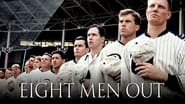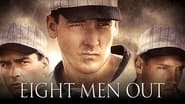Wordiezett
So much average
SpuffyWeb
Sadly Over-hyped
Marketic
It's no definitive masterpiece but it's damn close.
Sexyloutak
Absolutely the worst movie.
Red-125
Eight Men Out (1988) was written and directed by John Sayles. The movie is a dramatization of the events before, during, and after the 1919 World Series. I found this movie both fascinating and moving.Director Sayles--who also plays journalist Ring Lardner--has formulated the film as a labor vs. management struggle. Sayles portrays club owner Charles Comiskey as a miserly, selfish, dictatorial boss. His team was the finest in baseball, yet he underpaid them, broke promises to them, and got rich while they remained poor. From this perspective, most of the players were easy targets for gamblers, who arranged for them throw the series and collect the cash offered to them.The acting was excellent, especially by John Cusack, who played George 'Buck' Weaver. Weaver maintained that he was innocent until the day he died, and Cusack made that position believable. Also excellent was Hugh Fullerton who played journalist Studs Terkel.If you love baseball, this is a can't-miss movie. If you don't love baseball, I still recommend it. That's because it's very dramatic, and it really is a labor film as much as it's a baseball film. We saw the movie in the wonderful Dryden Theatre in George Eastman House, in Rochester, NY. It was part of the excellent Rochester Labor Film Series.It was a treat to see an original print of the film projected on the large screen at the Dryden. I think some of the drama of the baseball games will be lost on the small screen, but the film will work well anyway. Find it and see it!
Maziun
I've never been a fan of baseball. The only movies about baseball that could interest me were comedies ("Major league" , "Dullham bulls") . Until I've seen "Field of dreams" and this one. Then I realized that you could make a serious movie with baseball in it."Eight men out" is a story about corruption. The movie never takes any side , it allows us to choose our own interpretation of whole story. It seems that everyone here has some sins – the players , the club owners, the journalists and frauds. The movie has cast full of stars – John Cusack ("Say anything"), Christopher Lloyd ("Back to the future") , Charlie Sheen (TV series "Two and half men") , Michael Rooker ("Cliffhanger") . It's entertaining even for someone who doesn't know a thing about baseball (like me). It's quite long movie (almost 2 hours) , yet never a moment is wasted . The atmosphere of the post - I world war America is top notch , especially the music .A good movie worth a chance . Recommended for sports fans. I give it 7/10.
Michael_Elliott
Eight Men Out (1988) **** (out of 4) John Sayles wrote and directed this flawless docu-drama of the 1919 Chicago White Sox scandal where eight players were accused of throwing the World Series. It seems this drama gets pushed behind other baseball movies from this era. I love films like BULL DURHAM and MAJOR LEAGUE and while both of them are tremendously entertaining, in my estimation it's EIGHT MEN OUT that's the better movie. There's no doubt that it helps if you know about the real case but the perfection in this movie is so clear that it's impossible not to get caught up in the drama and tragedy of the events. I think Sayles did a remarkable job capturing the mood and spirit of the country during this era. The visual style of the film is something that really captures this but you've also got to give the set designers and costume designers a lot of credit. The look of the film really makes you feel as if you're back in 1919 and this really helps sell the story. I thought the screenplay was a major benefit as well because it seems that Sayles was interested in telling the story and not really playing favorites. The players are all shown as being guilty but it also shows them as being human in why they took the money. The film shows what a scam the trial was but it also shows that the children who looked up to these players were the real losers. It also doesn't hurt that you've got a tremendous cast bringing these characters to life. John Cusack, John Mahoney, Charlie Sheen, David Strathairn, Christopher Lloyd, D.B. Sweeney, Michael Rooker, Michael Lerner, Studs Terkel and Clifton James are all terrific and certainly deserve much credit. I've heard people complain that certain bits of the story were left out but obviously they couldn't put everything in a two hour movie. I've also heard negative reviews stating that the importance of Joe Jackson should have been given more of a spotlight but I thought the film made a wise choice in letting all stand as equals since they all went into this as one. EIGHT MEN OUT really is one of the best and smartest baseball movies out there.
Richard Burin
Eight Men Out (John Sayles, 1988) is a meticulous reconstruction of the Black Sox scandal, which saw a gaggle of poorly-paid Chicago baseball players agree to throw the 1919 World Series for 10 grand a piece. Based on a 1963 novel, Sayles' straightforward, detailed telling focuses on Buck Weaver (John Cusack), pitcher Eddie Cicotte (David Strathairn) and the legendary "Shoeless" Joe Jackson (D.B. Sweeney, who is just superb). Though Weaver sat in on meetings between the conspirators, he never took a penny and was singled out in contemporary press reports as the White Sox's top performer during the series. Cicotte initially resisted organiser Chick Gandil's overtones, but ultimately buckled after he was denied a bonus by club owner Charles Comiskey. Jackson's role remains disputed, though historians tend to lean towards his innocence. The three were ultimately banned from baseball for life, along with five other players.We start with an uplifting opening sequence that sees the rampaging White Sox clinch the pennant. Superbly scored, shot and edited, with one particular high spot that sees Jackson thump a home run, the scene may just have got me interested in baseball. Returning to the club house, the players find a celebratory crate of wine and decide it's a good time to enquire about their long-promised bonus. You're looking at it, Comiskey's sidekick tells them. It's flat, naturally. With pay so low and their boss backtracking on his word, Sayles suggests, the players are plum pickings for unscrupulous gamblers, including Sleepy Bill Burns (Christopher Lloyd, who's distractingly artificial), Billy Maharg (Richard Edson) and Sport Sullivan (Kevin Tighe), all three ultimately backed by multi-millionaire gangster Arnold Rothstein (Michael Lerner). When the series starts, and the on-field fluffs keep coming, sportswriters Ring Lardner (Sayles himself) and Hugh Fullerton (Studs Terkel) smell a rat - and start digging.Sayles slightly contracts the timeframe for dramatic purposes - the incident with the wine happened after the team's 1917 series win, while the team played on into 1920 and the players' trial ended in 1921 - but shows an impressive fidelity to the bulk of the facts that extends to the locations of meetings. Where he falls short is in successfully elaborating on the motives of the crooked players, beyond the pay packet, which wasn't that substantial. Though Sayles shows Rothstein's exact movements during a matchday and Cicotte's aggressive pitch that signalled the fix was on, he skimps on the explanatory conversations that would have filled in various blanks and leaves out the odd telling detail, curiously neglecting to mention Cicotte's expensive new farm. Or Gandil's swift departure for California, with $35,000 in his pocket.It's difficult to fault the rendering of time and place and, at least to this unskilled eye, the restaging of the matches is extremely adept and exciting. Cusack's look of bewilderment, alienation and frustration on the field as he sees the team crumbling around him is moving and the scenes of the Sox briefly reneging on their pledges and going hell for leather are triumphant, but given the absolutely fascinating, highly emotive subject matter, Sayles doesn't really articulate the scale of human drama present, or provide the social and emotional context to make Eight Men Out a great, even definitive take on the scandal. That the gut-smacking sledgehammer to end them all, a young boy's tearful plea to his idol for some form of explanation ("Say it ain't so, Joe") doesn't pack a wallop is a sign of the film's failings. Indeed, the film doesn't strike quite the right note until the devastating, bleached-out coda, which works extremely well and set the tone for the following year's Field of Dreams, another movie dealing with the Shoeless Joe legend. Eight Men Out is a highly engrossing, very well-acted movie, but given the writer-director and the entirely compelling topic, it doesn't quite hit the heights.









